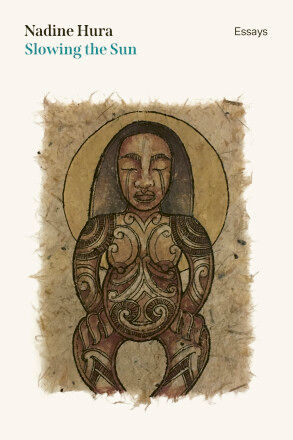Slowing the Sun by Nadine Hura
- NZ Booklovers

- Oct 24, 2025
- 2 min read

Nadine Hura’s Slowing the Sun is a remarkable collection of essays that moves fluidly between memoir, environmental inquiry and whakapapa-driven reflection. What begins as a dive into climate change activism gradually evolves into a far more personal excavation of grief, identity, and Indigenous knowledge. The result is a work that is at once urgent and intimate - a conversation in the margins needing to be heard.
The collection opens with Hura facing the vast, often overwhelming complexity of climate science. She questions how to speak of ecological collapse in a way that feels true to lived experience rather than distant abstraction. Early essays trace her attempts to learn language that can hold both the enormity of cumulative damage and the rootedness of land. Following the death of her brother, the tone shifts and deepens. The personal becomes inseparable from the political: land loss, environmental breach, colonial histories and familial pain converge in lines that refuse to let the reader remain an outsider.
Characterisation here is subtle but powerful: Hura herself becomes guide, interlocutor and mourner. Her voice is self-aware, vulnerable, and shaped by the tensions of being Māori and Pākehā. She honours her whānau (her father, her brother, elders whose lives were shaped by structural neglect) and treats them not as symbols but as living presences whose stories illuminate environmental injustice. Critically, Hura resists flattening her experiences into easy allegory; instead, she leans into complexity, ambiguity, even discomfort.
Thematically, the essays insist that climate change cannot be disentangled from colonialism, racism and dispossession. Hura argues that responses to environmental crisis must be grounded in Te Tiriti and in Indigenous renewal, rather than mere technocratic fixes. The notion of whakapapa and our connections across generations, land and language runs through the collection as a kind of spine. She insists that the stories we tell, the names we remember, the relationships we sustain, all matter in a world that seeks to erase difference and depth.
Stylistically, Slowing the Sun bears the mark of a poet. Hura’s prose is precise, sensory and rhythmic. She moves between dense sections of explanation and quiet interludes of metaphor, often surprising the reader with a fresh image or turn of phrase. The structure is non-linear: essays fold back on themselves, sometimes branching into poetic vignettes or pūrākau reimaginings. That elasticity is part of its power: it models what it means to think across genres, across science and myth, across grief and hope.
In terms of literary significance, Slowing the Sun represents a new wave of Māori writing that refuses simple categorisation. It sits comfortably in the space between personal and collective, between activism and elegy. Hura furthers a path opened by recent Māori writers who argue that telling the climate story must include Indigenous frameworks, emotional honesty and critique of power. This is not a handbook but a work of witness, one that invites readers to sit with fragility, to question dominant narratives, and to remember that the earth, memory and mourning are tied together.
Slowing the Sun will linger in the mind. It asks us how to hold loss without cynicism, care without despair. Nadine Hura does not offer easy answers, but in her sincerity and precision she offers something more rare: language that reaches, again and again, toward justice.
Reviewer: Chris Reed
BWB



